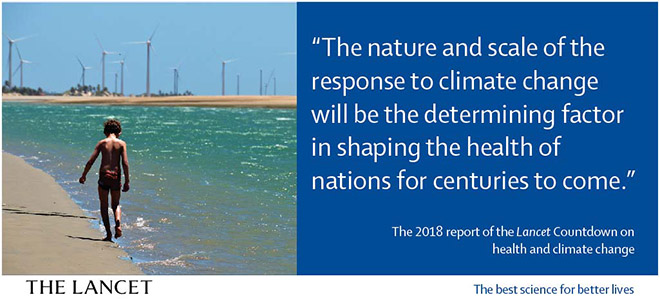
Research from 27 global institutions including CU Boulder show extreme heat damages health and livelihood and may overwhelm hospitals
New research published in The Lancet medical journal last night shows that rising temperatures as a result of climate change are already exposing us to an unacceptably high health risk and warns, for the first time, that older people in Europe and the East Mediterranean are particularly vulnerable to extremes of heat, markedly higher than in Africa and SE Asia.
Leading doctors, academics and policy professionals from 27 organizations, including CIRES fellow and Center for Science and Technology Policy Research (CSTPR) director Max Boykoff and Olivia Pearman, Lucy McAllister, Meaghan Daly from CU’s Media and Climate Change Observatory, have contributed analysis and jointly authored the report. As members of The Lancet Countdown: Tracking Progress on Health and Climate Change, partners behind the research include the World Bank, World Health Organization (WHO), University College London and Tsinghua University, among others.
“Climate change is not just an environmental issue, rather it is one involving science, policy, culture, psychology, environment and society,” said Boykoff. “As part of the larger collaboration, I, with members from our Media and Climate Change Observatory at the University of Colorado, examined media representations to help understand public discourse on climate change and health over the past eleven years.”
Boykoff’s team determined global coverage of climate and public health has increased by 42 percent between 2007 and 2017, indicating a gradual but promising trend toward more sustained attention to climate change and public health in the public arena, said Boykoff.
Some of the new health impacts of heat documented in The 2018 Report of The Lancet Countdown on health and climate change include:
- 157 million more vulnerable people were subjected to a heatwave last year than in 2000, and 18 million more than in 2016.
- 153 billion hours of work were lost in 2017 due to extreme heat as a result of climate change. China alone lost 21 billion hours, the equivalent of a year’s work for 1.4% of their working population. India lost 75 billion hours, equivalent to 7% of their total working population. New methodologies have captured this data for the first time.
- Rising ambient temperatures are placing vulnerable populations at increased risks across all regions of the world. Europe and the East Mediterranean are particularly at risk, most likely due to ageing populations living in cities, with 42% and 43% of over 65s vulnerable to heat exposure. Markedly higher than Africa (38%) and southeast Asia (34%).
- Heat greatly exacerbates urban air pollution, with 97% of cities in low- and middle- income countries not meeting WHO air quality guidelines.
- Heat stress, an early and severe effect of climate change, is commonplace and we, and the health systems we rely on, are ill equipped to cope.
- Rising temperatures and unseasonable warmth is responsible for cholera and dengue fever spreading, with vectorial capacity for their transmission increasing across many endemic areas.
- The mean global temperature change to which humans are exposed is more than double the global average change, with temperatures rising 0·8°C versus 0·3°C.
This story was modified from Lancet’s press release. To view the complete Lancet press release, click here.

